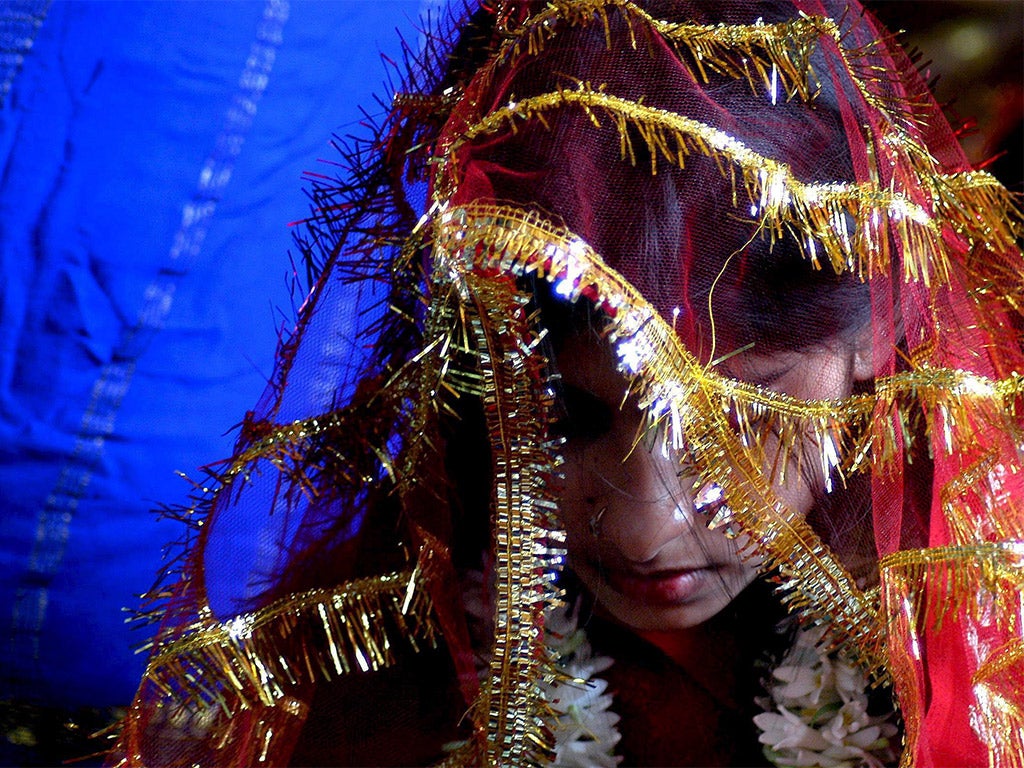Forced marriages: The shame of modern Britain
The whole point of marriage is that it is a consensual agreement


Your support helps us to tell the story
From reproductive rights to climate change to Big Tech, The Independent is on the ground when the story is developing. Whether it's investigating the financials of Elon Musk's pro-Trump PAC or producing our latest documentary, 'The A Word', which shines a light on the American women fighting for reproductive rights, we know how important it is to parse out the facts from the messaging.
At such a critical moment in US history, we need reporters on the ground. Your donation allows us to keep sending journalists to speak to both sides of the story.
The Independent is trusted by Americans across the entire political spectrum. And unlike many other quality news outlets, we choose not to lock Americans out of our reporting and analysis with paywalls. We believe quality journalism should be available to everyone, paid for by those who can afford it.
Your support makes all the difference.When I first came across the phrase “forced marriage”, my instinctive response was that of most people: that it is an oxymoron. The whole point of marriage is that it is a consensual agreement, hopefully with a spot of romance thrown in and the approval of two families and their respective communities.
“Communities” is the operative word here, because the second thing that crossed my mind on seeing the phrase, and reading this newspaper’s excellent series over the past five days, is that this practice should shame Britain. It has no place in a modern, tolerant society, and we ought not to ignore the fact – and it is a matter of fact – that, as with other traditions that have caused such justified recent outrage, such as female genital mutilation (FGM) and honour violence, it is particular communities that we are talking about. And often particular religious traditions, too.
Stating this as a matter of fact ought not to be controversial, but in my experience it is. The point is not to isolate or target a particular and undeserving minority group; on the contrary, the motivation must be to address and ultimately eradicate practices and traditions that we as a society disapprove of. I am happy to assume, by the way, that readers of The Independent and, indeed, all right-thinking people in Britain, find the idea of teenage girls going off for summer holidays to, say, South Asia, never to return, absolutely abhorrent. I certainly do.
In the past a form of political correctness has impeded our response to such problems. That is why I was glad to see this recent series highlight the breadth and complexity of this scandal.
Clearly there are moves afoot within government to increase the number of prosecutions (so far there has been just one). And it isn’t always easy to move to a prosecution, because of the difficulty in encouraging victims to come forward when they are often terrified of the consequences. I would hope that this newspaper’s series, and some of the stories and information it conveyed, will indeed encourage other victims to come forward.
Ultimately, however, it cannot be up to government alone to intervene. Forced marriage is illegal in Britain, and while we need the present law to be enforced more effectively, it’s not that we need new laws to be created. Rather than the heavy hand of the law, the softer pressure of social stigma is the best tool with which to demolish a vile, anachronistic practice. That means people right across Britain saying we won’t tolerate this. And, still more importantly, it means all members of the relevant communities saying, without exception, that forced marriage is a barbaric idea, the residue of morally inferior traditions, and no amount of special pleading on behalf of a minority culture or faith can excuse it.